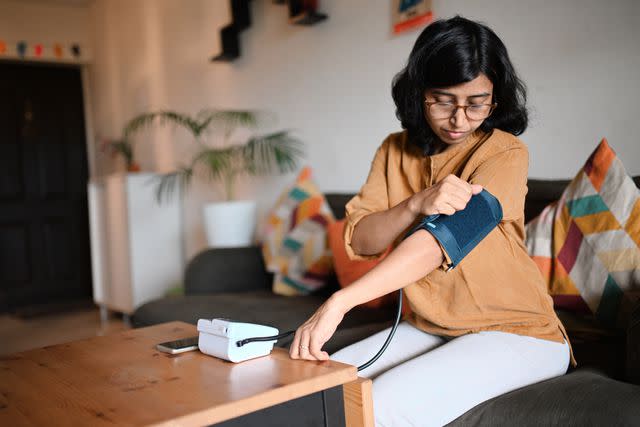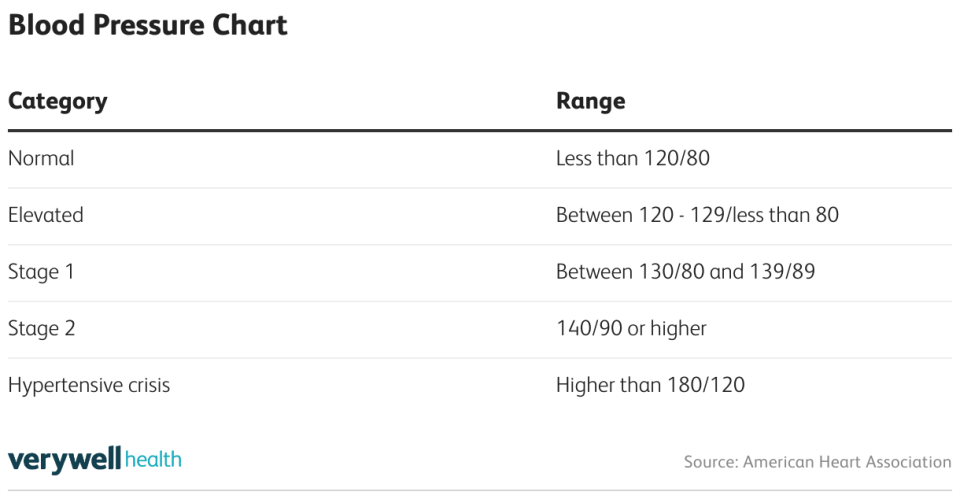What Are the Symptoms of High Blood Pressure in Women?
Medically reviewed by Christopher Lee, MD
Roughly half of all American adults have high blood pressure (hypertension). Men are more likely to develop high blood pressure than women, with 50% of adult men living with high blood pressure compared to 44% of women.
Left untreated, high blood pressure can damage the blood vessels, heart, brain, and other organs. Hormonal changes due to conditions such as menopause and pregnancy contribute to high blood pressure risk in women.
This article provides a blood pressure chart and describes how high blood pressure affects women.

Mayur Kakade / Getty Images
Related: What Is Hypertension (High Blood Pressure)?
A Note on Gender and Sex Terminology
Verywell Health acknowledges that sex and gender are related concepts, but they are not the same. To reflect our sources accurately, this article uses terms like “female,” “male,” “woman,” and “man” as the sources use them.
What Are High Blood Pressure Levels in Women?
The threshold to diagnose high blood pressure is not gender-specific, meaning that high blood pressure in women is classified the same as high blood pressure in a person of any other gender.
Generally, normal blood pressure is considered 120/80 millimeters of mercury (mm Hg). Above that, a blood pressure of up to 130/80 is considered elevated. Healthcare providers determine your blood pressure stage based on a specific range, as seen in the blood pressure chart below:

Some blood pressure charts consider specific factors, such as age and race or ethnicity.
Symptoms of High Blood Pressure in Women
For most people, high blood pressure develops with no noticeable symptoms over time. When symptoms do occur, they may be more pronounced in women. However, they're often attributed to other health concerns, such as stress, anxiety, or menopause.
Symptoms of High Blood Pressure in Older Women
Older women with stiff or congested arteries are less likely to experience symptoms of high blood pressure compared to younger women, according to some reports. Young to middle-aged women are more likely to experience symptoms of high blood pressure. Examples of these symptoms include:
Blurred vision
Chest pain that appears alongside stress, without radiating to other areas
Fatigue, lack of energy, and difficulty sleeping
Headaches
Occasional fluid retention in the ankles, hands, or eyes
Pain that starts in the chest and radiates to the jaw, shoulders, or left arm
Palpitations, increased heart rates, or atrial fibrillation
Severe sweating during the day or at night
Tight, persistent chest pain at rest
Your bra feels like it's fitting too tight
Many of these symptoms can also overlap with hormonal changes and fluctuations in sex hormones. Menopause (when menstrual periods have seized for 12 months in a row) and pregnancy all play a significant role in the development of high blood pressure in women—especially during middle age.
High Blood Pressure in Transgender Women
If you have undergone any form of gender reassignment therapy, hormonal therapies can have an impact on various physiological processes, including your blood pressure.
One study revealed that gender-affirming hormone therapy (GAHT) can dramatically increase blood pressure levels. However, the young age at which most individuals seek these treatments can be protective against reaching stages 1 or 2 hypertension.
If you have undergone or are planning to seek GAHT, talk to your healthcare team about your medical history and how hormonal therapies can impact your health.
High Blood Pressure and Pregnancy: Understanding Preeclampsia
Hormone levels can trigger changes in blood pressure, which is why pregnant people are at risk for preeclampsia, a high blood pressure condition that occurs during pregnancy. Changing hormone levels, increased fluid retention in the body, and other physical stressors contribute to preeclampsia.
Gestational hypertension and preeclampsia are two severe variations of this condition that can cause problems for pregnant people and their developing fetuses.
All pregnant people should have their blood pressure checked regularly and be screened for conditions like preeclampsia and eclampsia (a seizure disorder in pregnant people). Your healthcare team will monitor your blood pressure closely and suggest treatments based on your blood pressure level and other underlying conditions.
Some risk factors for developing complications with high blood pressure during pregnancy include:
A history of preeclampsia during previous pregnancies
Gestational hypertension is usually diagnosed in pregnant people who have normal blood pressure levels before pregnancy but develop blood pressures of 140/90 mm Hg and up in the second half of pregnancy.
Preeclampsia typically appears during the second half of pregnancy, usually in the third trimester. You may be diagnosed with this condition if you have repeated high blood pressure readings alongside proteins in your urine. Certain proteins in the urine are a sign of multi-organ danger and often signal the need for immediate medical treatment—and, in some cases, early delivery.
However, there are other indicators of preeclampsia that may occur without proteins present, such as abnormal kidney function or headaches.
High blood pressure and preeclampsia during pregnancy can put you and your fetus at risk for immediate complications. It can also increase your risk of developing high blood pressure or other cardiovascular problems later in life.
What Uncontrolled Blood Pressure Does to the Body
Untreated high blood pressure can cause permanent damage to your blood vessels, organs, and other body tissues. The strain of increased force of high blood pressure on your blood vessels and tissues—and the extra work your heart does—can cause significant health issues like:
Cardiovascular disease
How to Treat High Blood Pressure in Women
Treatment options for high blood pressure are similar regardless of gender and usually include a combination of prescription medications, diet modification, and lifestyle changes.
If your blood pressure gets too high, a healthcare provider will prescribe one or more medications to control it, and it's important that you stick to the prescribed regimen.
The classes of medications most often used to treat high blood pressure include:
Angiotensin converting enzyme (ACE) inhibitors
Alpha-2 receptor agonists
Alpha-blockers
Angiotensin 2 receptor blockers
Beta-blockers
Calcium channel blockers
Combined alpha- and beta-blockers
Diuretics
Vasodilators
Outside of these medications, though, nondrug strategies can help manage your blood pressure and should be used alongside any medications.
Home Remedies to Lower Blood Pressure Naturally
In addition to medications and meeting regularly with a healthcare provider, strategies such as the following can help you manage and even lower your blood pressure naturally:
Getting enough sleep
Exercising regularly
Reducing stress through meditation
Long-term stress reduction and adherence to a healthy, well-balanced diet can help you manage your blood pressure. It's also important to know how to check your blood pressure at home and what your readings mean.
How to Prevent High Blood Pressure
Maintaining lifelong healthy habits is the best way to prevent high blood pressure. Making healthy changes as you age can help you avoid severe high blood pressure.
Whether you are trying to prevent high blood pressure or you are working to reduce your blood pressure alongside medications, the following measures can help:
Eating a healthful diet
Exercising
Limiting alcohol consumption
Quitting smoking
Reducing stress
Related: Genetic Risk Factors for High Blood Pressure
When to Contact a Healthcare Provider
If your blood pressure readings are high on two or more healthcare visits, your healthcare team will probably start discussing lifestyle changes to prevent high blood pressure and related complications. Depending on your blood pressure stage, a healthcare provider may prescribe medication.
If you have repeated elevated (high) blood pressure readings at home, schedule an appointment to see a healthcare provider.
A blood pressure reading of 180/120 or higher—even on a single occasion—can be a sign of trouble, especially if it appears alongside symptoms like chest pain, vision changes, or headache. If you have a blood pressure reading or symptoms that fall into this category, visit your nearest urgent care or emergency department, or call 911 for immediate medical attention.
Summary
Women are less likely than men overall to develop high blood pressure, but the numbers are close, and women may experience symptoms that men don't have. Women are also at risk for high blood pressure when hormone levels change, like during pregnancy or menopause. See a healthcare provider for regular health screenings and blood pressure monitoring.
Read the original article on Verywell Health.

